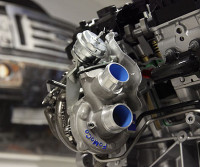
You’ve probably seen a lot more “turbo” emblems on the road lately. That sounds fast! What on earth is it doing on the back of a Hyundai?
Turbos are a great example of high-end technology for ordinary people. While they make Porsches and Ferraris go faster, they can also save your family sedan some serious gas. Today we’re going to talk about how turbos work and how to maintain them!
Bigger Isn’t Always Better
To understand a turbo, you first have to understand how a car engine works. Your engine is a giant air pump: air gets sucked in, explodes, and then gets spit out. That explosion makes a bunch of connected parts move around, moving your wheels.
With that in mind, engines are limited by how much air they can fit in themselves. This is a measure called displacement, and it’s usually measured in liters. You may recognize the Volkswagen 1.8, or the Mustang 5.0.
As the Mustang indicates, engines with higher displacement usually have more power. But remember that explosion that happens in there? Bigger engines require more gas to facilitate that explosion. That’s why your 7.0 Suburban gets 15 MPG!
Big Things in Small Packages
A turbo solves this problem by compressing the air that’s pushed into your engine. When air is compressed, you can fit more in a smaller engine. The turbo is effectively a self-sustaining system: it’s powered by your engine’s own exhaust. So the faster you’re going, the faster the turbo moves. This is why some turbo cars experience “lag” when you first hit the gas; the turbo has to have an initial supply of power to start working.
A small engine with a turbo is very appealing. You get the gas mileage of a little car with the power of a bigger car. That’s why Ford calls their turbo engines “EcoBoost:” it’s the best of both worlds. If you turbo a big engine…well, you get something like the Bugatti Veyron.
Your next car will likely have a turbo, and get better gas mileage than ever before.
Maintaining a Turbo
Most turbo cars – especially newer ones – don’t require any more maintenance than a normal car. But they do require you stay on top of regular maintenance! Your turbo uses the same fluids as the rest of your engine, including oil and coolant. Because turbos are complex and run very hot, being late on your fluid changes and inspections can seriously shorten their lifespan.
Is your turbocharged car due for maintenance! The experts at Fast Lube Plus can help! Contact us today and schedule your appointment.
